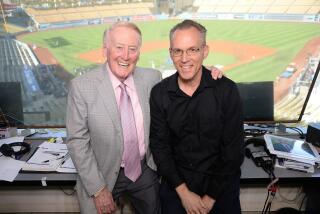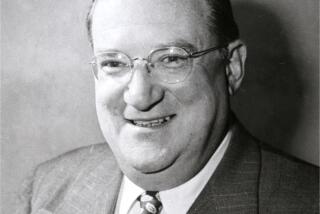Bitter Ending
- Share via
The obituary said he died at home. His good neighbors of Leimert Park smiled sadly when they read it.
Yes, of course, that electrical shed next to the dumpster behind the video store was Leon Wagner’s home.
“The more I thought about it, the more it made sense,” said Brian Breye, a local merchant. “Because the streets were his home.”
Leon Wagner was the first great slugger in Angel history, a 1962 All-Star game MVP, an engaging prince to kings Willie Mays and Mickey Mantle.
With his huge smile, loopy swing and funky throwing motion, the man known as “Daddy Wags” once held the Southern California baseball world in his giant palms.
Yet on Jan. 3, at age 69, he died with nothing.
He had no address, no car, little money. His final days were spent wandering the Crenshaw corridor streets.
Apparently bitter at baseball, clearly forgotten by nearly everyone in the game, he died after a long, losing bout with drug addiction and anger.
His final home was that closet-sized shed, where he slept on a foam mattress covered in old shirts, surrounded by plastic cups and bags of beans and rice.
“We kept asking this guy to leave, but he kept coming back,” a clerk at the video store said. “That was Leon Wagner? And he died?”
Daddy Wags was great with teammates, hilarious with reporters, perhaps the first lovable Angel, the perfect clubhouse host.
Yet on Thursday, at his memorial service a couple of blocks from that shed, not one person from major league baseball came to say goodbye.
Not one.
There were only about 25 mourners, leaving several empty rows in the small chapel.
Attendees were invited to step to the podium to share memories of a man who played a dozen years in the major leagues, yet only his son and daughter spoke.
Leon Wagner Jr. and Lei Juana Wagner had tried to help their father, and he wanted no part of it, yet they stood by him still.
One of his Cleveland Indian baseball cards, with his eyes bright and smile proud, was enlarged and mounted at the front of the room, appropriate for a man who was larger than life.
A giant who disappeared.
“Remember the first time they sent astronauts into space, and they weren’t afraid until they landed in the ocean?” asked Lou Johnson, a former Angel and Dodger. “That’s what happens to some old ballplayers, particularly from our era, particularly African American. When we retire, it’s like landing in the middle of the ocean without a rowboat.”
*
You know the baseball cliche about the great ones being able to fall out of bed and get a hit?
Leon Wagner might have been the only great for whom that statement is not apocryphal, but anecdotal.
While a kid with the San Francisco Giants in the late 1950s, he had fallen asleep at the end of the dugout when the Giants mounted a rally against the Dodgers.
With the Giants trailing by two, ninth inning, bases loaded, one out, he was approached by Manager Bill Rigney.
“Mr. Wagner!” Rigney said, rousing his outfielder. “If it wouldn’t be too much trouble, would you please go up to bat and hit? Preferably a home run?”
Wagner rubbed his eyes, trotted to the plate and promptly ... well, what do you think he did?
“I knew I’d catch hell if I hit into a double play, so I hit a home run,” Wagner later explained.
It was this sort of unpredictable power that made Wagner so impressive to the Angels, who acquired him in the spring of their debut 1961 season in a trade with minor league Toronto for Johnson.
The locals immediately fell in love with the 27-year-old left-handed batter, a cross between Mickey Hatcher and Mickey Mantle.
Teammates joked about his unusual batting stance, remarking that he held the bat as if he were holding a snake.
Jim Murray poked fun at the way he threw, writing, “He looks more like a man trying to make a spare than a putout.”
Wagner laughed through it all, leading the Angels with 28 homers in that first season, then hitting 37 homers with 107 runs batted in in 1962 to rank among the best in baseball.
In the middle of that second season, in the second All-Star game of that summer, he hit the tiebreaking homer and made a diving catch to win MVP honors.
“I don’t pay any attention to sportswriters and jealous players who criticize me,” he said at the time. “I know I got it.”
He indeed had it, making fans laugh and cheer at the same time.
When asked once why he would not catch fly balls with two hands, he said, “My other hand might get in the way.”
His fielding struggles became legendary the day he chased down a ball under a bullpen bench ... and came up throwing a white paper beer cup.
When it was determined he needed glasses, he put them on, looked in the clubhouse mirror and let out a shriek.
“Whadda ya know!” he shouted. “I’m colored!”
*
That first season with the Angels, Leon Wagner was their only African American player and remained their only prominent African American player during his three-year tenure.
During those days, it was more than a statistic, it was an unfair responsibility.
“During that time, for all African Americans in the sport, you had to walk around on needles,” said Jim “Mudcat” Grant, longtime pitcher and Cleveland teammate of Wagner. “We were still fairly new to the sport, so you had to be perceived as a good guy. If you did anything out of whack, there was hell to pay.”
Grant, who tried to help Wagner later in life, said his friend played the role.
“You had to have a certain resolve to make it back then,” Grant said. “Leon did that as well as anybody.”
He established himself in the Crenshaw corridor community. He opened a clothing store with the motto, “Get your rags from Daddy Wags.”
And then, as quick as a quip, he was gone.
Traded, in the winter of 1963 to the Indians for first baseman Joe Adcock and pitcher Barry Latman.
Traded, even though he had more homers that season (26) than any other three Angels combined.
Traded, perhaps because he struggled at Dodger Stadium, which was the Angels’ home. Or perhaps it was because he owed the team money when his clothing store failed. Or maybe General Manager Fred Haney was weary of his bluntness.
He ripped Haney, calling him “a sort of Khrushchev.” He ripped Cleveland, claiming it wasn’t even in the United States.
“Instead of trading me, he should have doubled my salary,” he said of Haney.
Underneath hyperbole, there was a deep sense of betrayal.
Wagner thought he was putting on a good show for the organization, yet the Angels closed the curtain. He had finally found a home in south Los Angeles, and now the Angels were shipping him to the more intolerant Midwest.
He would talk about this trade for the rest of his life. Even in the end, wandering the streets, he would mumble his bitterness.
“I don’t think he ever got over being traded,” Grant said. “That hurt him the most.”
Based on the remainders of their careers, it was, indeed, a horrible deal.
Latman won 12 games and lost 24. Adcock hit 32 homers with 95 RBIs.
Wagner hit 98 homers, with 325 RBIs, and was named one of the Indians’ top 100 players.
In the end, while walking through alleys of a town he once thought he could own, little could console him.
“He was a good man, but he had a grudge,” said Lloyd Linzy, a retired health inspector who spoke with Wagner. “He had resentment. He would say the Angels were paragons of racial injustice.”
*
Brian Breye remembers the first time he saw him; a tall, thinning guy walking aimlessly on the streets around Breye’s Leimert Park Village museum.
“Somebody pointed him out to me,” said Breye. “I said, ‘That’s Leon Wagner?’ ”
It was about 10 years ago. After three marriages and several failed ventures, this is where Leon Wagner ended up.
“I saw him sitting on the curb at 43rd and Leimert,” said Ed MacDaniel, a local realtor. “I said, ‘What are you doing there?’ He said he had no place to live. He said he owed people.”
Wagner had retired in 1969, before free agency and big pensions. He retired without a college degree and without ever making more than about $50,000 a year, according to Grant.
Most important, like many African American players of that era, he retired without connections.
“You have to understand, a lot of us didn’t know any CEOs or have friends in high places,” said Grant, a former broadcaster who is now a musician and entrepreneur. “Some of us had to take menial jobs. Guys couldn’t make any money. They got depressed. They didn’t feel good about themselves.”
What Leon Wagner felt he had given the world, the world wasn’t giving back. The feeling was as common among African American players of his era as aching knees.
“I’ve got a list as long as your leg of players in similar situations,” said Johnson, who is on the board of directors of the Baseball Assistance Team, a group that helps former players and baseball employees in need. “Lots of us walk away from this and something doesn’t click. Life is never the same, and we have a hard time with it.”
MacDaniel set up Wagner in a couple of apartments, deducting rent from the monthly pension checks.
“But then he started doing drugs, and that was the end of it,” MacDaniel said.
Wagner’s two children tried to help but he wouldn’t allow it. He drifted from apartment to apartment, being evicted because MacDaniel said he would blow the rent on drugs.
About eight years ago, Johnson heard that Wagner surfaced and began quietly visiting his old friend and arranging for funds from the BAT organization. At one point, he even brought him plane tickets and a reservation at a substance abuse center in Florida.
“But he never showed, he was in denial,” said Johnson, a former drug and alcohol abuser who has been clean for more than 23 years. “Daddy Wags told me, ‘I’m not like you.’ ”
When the Angels found him through a player search last spring, when he was still living in an apartment, they invited him to speak at a school, and he did well.
“He looked great,” said Matt Bennett, the team’s community development manager. “We had no idea of his situation.”
But then, Daddy Wags was always good at putting on a show.
Few outside Leimert Park knew that, by then, he had moved into an abandoned Lincoln Continental donated by Breye.
Everyone knew what he was eating because old pizza boxes were stacked on the seats. Many still knew he was a baseball player because, amid all the trash and old L.A. Times sports sections that filled the windows, there was a baseball.
“He would take a broomstick and show me how he used to hit,” Breye said. “He always kept his dignity.”
Breye would continue to help him, allowing Wagner to wash in his sink as well as live in his car, but he knew things weren’t getting better.
“I could see the pain and hurt in his face,” he said.
Faadil Asadullah, who owns a Leimert Park Village clothing store, remembers the looks they would get when people saw them chatting about baseball.
“We’d be talking and people would come in and I’d say, ‘Yeah, this guy was a major league player,’ ” Asadullah recalled. “And they would say, ‘Yeah, right.’ ”
Asadullah said he understood why nobody believed.
“In the beginning, when I met him, he looked like a ballplayer,” he said. “But in the end, he looked like just another homeless guy trying to survive.”
In the end, a life of filled stadiums ended in a half-empty chapel, the laughter silenced, the cheers vanished, nobody around to joke about Daddy Wags and the beer cup.
“Baseball forgets about us, the public forgets about us,” said Grant, who was in Florida working a fantasy camp. “Daddy Wags reminds us, we all have short arms today. We all need to reach down more than we are reaching.”
The game may have forgotten Leon Wagner, but he never forgot the game. Discovered in the grime of his shed was one shiny white shoe, ready for a quick foot on a warm night, missing the lace, but filled with possibility. A baseball cleat.
*
Bill Plaschke can be reached at [email protected]. To read his previous columns, go to latimes.com/plaschke.
*
(BEGIN TEXT OF INFOBOX)
The Stuff of Local Legend
In the days before free agency, a major league expansion team tended to be a collection of has-beens and unproven players. A young slugger like Leon Wagner gave the Angels a marquee player and instant credibility:
* 1961 -- Wagner hit 28 home runs, eighth in the American League, and drove in 79 runs to help the Angels to a 70-91 record.
* 1962 -- Wagner had a breakout season with 37 home runs and 107 RBIs, helping the Angels contend for the AL title before finishing third at 86-76. He finished fourth in the MVP voting (behind Mickey Mantle, Bobby Richardson and Harmon Killebrew) and started in both All-Star games that year, homering in the second game to earn MVP honors.
* 1963 -- Wagner hit 26 home runs, in a year in which none of his teammates hit more than nine, and drove in 90 as the Angels slipped back to 70-91. In three seasons, he hit 91 home runs and drove in 276 runs.
More to Read
Go beyond the scoreboard
Get the latest on L.A.'s teams in the daily Sports Report newsletter.
You may occasionally receive promotional content from the Los Angeles Times.







